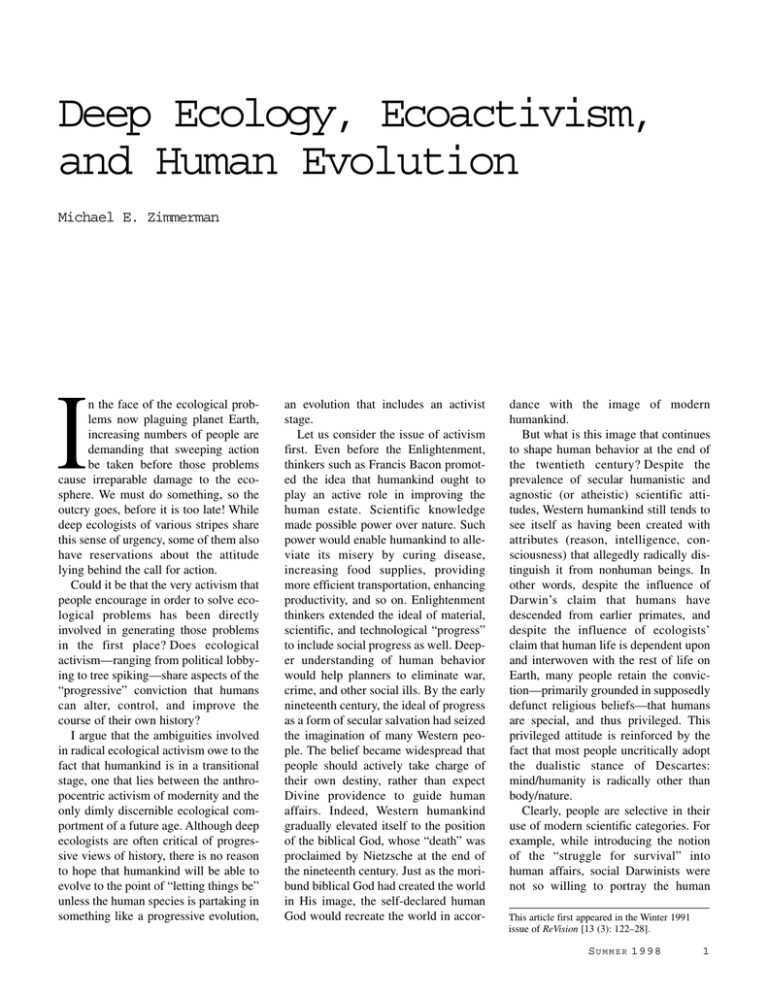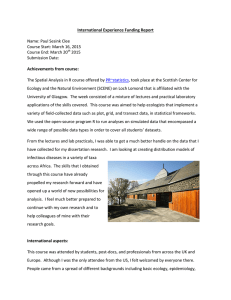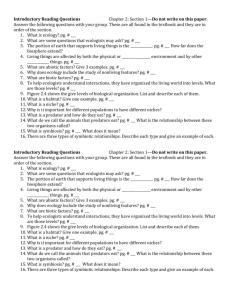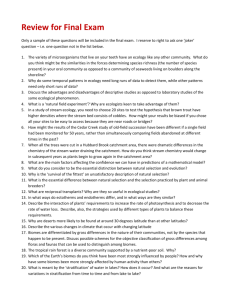n the face of the ecological prob-
advertisement

Deep Ecology, Ecoactivism, and Human Evolution Michael E. Zimmerman I n the face of the ecological problems now plaguing planet Earth, increasing numbers of people are demanding that sweeping action be taken before those problems cause irreparable damage to the ecosphere. We must do something, so the outcry goes, before it is too late! While deep ecologists of various stripes share this sense of urgency, some of them also have reservations about the attitude lying behind the call for action. Could it be that the very activism that people encourage in order to solve ecological problems has been directly involved in generating those problems in the first place? Does ecological activism—ranging from political lobbying to tree spiking—share aspects of the “progressive” conviction that humans can alter, control, and improve the course of their own history? I argue that the ambiguities involved in radical ecological activism owe to the fact that humankind is in a transitional stage, one that lies between the anthropocentric activism of modernity and the only dimly discernible ecological comportment of a future age. Although deep ecologists are often critical of progressive views of history, there is no reason to hope that humankind will be able to evolve to the point of “letting things be” unless the human species is partaking in something like a progressive evolution, an evolution that includes an activist stage. Let us consider the issue of activism first. Even before the Enlightenment, thinkers such as Francis Bacon promoted the idea that humankind ought to play an active role in improving the human estate. Scientific knowledge made possible power over nature. Such power would enable humankind to alleviate its misery by curing disease, increasing food supplies, providing more efficient transportation, enhancing productivity, and so on. Enlightenment thinkers extended the ideal of material, scientific, and technological “progress” to include social progress as well. Deeper understanding of human behavior would help planners to eliminate war, crime, and other social ills. By the early nineteenth century, the ideal of progress as a form of secular salvation had seized the imagination of many Western people. The belief became widespread that people should actively take charge of their own destiny, rather than expect Divine providence to guide human affairs. Indeed, Western humankind gradually elevated itself to the position of the biblical God, whose “death” was proclaimed by Nietzsche at the end of the nineteenth century. Just as the moribund biblical God had created the world in His image, the self-declared human God would recreate the world in accor- dance with the image of modern humankind. But what is this image that continues to shape human behavior at the end of the twentieth century? Despite the prevalence of secular humanistic and agnostic (or atheistic) scientific attitudes, Western humankind still tends to see itself as having been created with attributes (reason, intelligence, consciousness) that allegedly radically distinguish it from nonhuman beings. In other words, despite the influence of Darwin’s claim that humans have descended from earlier primates, and despite the influence of ecologists’ claim that human life is dependent upon and interwoven with the rest of life on Earth, many people retain the conviction—primarily grounded in supposedly defunct religious beliefs—that humans are special, and thus privileged. This privileged attitude is reinforced by the fact that most people uncritically adopt the dualistic stance of Descartes: mind/humanity is radically other than body/nature. Clearly, people are selective in their use of modern scientific categories. For example, while introducing the notion of the “struggle for survival” into human affairs, social Darwinists were not so willing to portray the human This article first appeared in the Winter 1991 issue of ReVision [13 (3): 122–28]. S U M M E R 1998 1 species as what Aldo Leopold would later call “plain citizens” of the biotic community. Instead, social Darwinists, like many other secular humanists, insisted that some animals are more equal than others. The competitive struggle within human society was valuable because it promoted the overall fitness of the species whose rationality (the biblical “image of God”) gave it the “right” to dominate the rest of nature. Hence, naturalistic ideas about the survival-oriented competition among species combined synergistically with quasi-religious ideas about human specialness to produce the industrial juggernaut of “naturalistic humanism.” During the century now ending, industrial capitalism and communism have competed to gain total control of the planet and everything living upon, beneath, and above it. There is no need to review the astonishing, titanic, climate-altering interventions accomplished by the forces of the industrial world. Today, a number of people are beginning to suspect that humanity’s very attempt to gain control, an attempt that at one time appeared to be so laudable and noble, may end up in a total loss of control, the cost of which may be the extinction of millions of species, including homo sapiens. Despite increasing recognition that an action-oriented stance is deeply implicated in ecological problems, most people conclude that the only alternative to an active, interventionist, control-oriented posture must be one of passive submission. From the ecoactivist perspective, such a passive stance borders on suicidal cowardice. Hence ecoactivists maintain that we must take decisive steps to counter the actions of industrialists bent on turning the planet into a giant factory. Deep ecologists join in the criticism of the often-rapacious industrial activism motivated by anthropocentric, naturalistic humanism, that is, the doctrine that humans are the origin of all value, purpose, and meaning. Yet deep ecologists do not concede that the only alternatives to anthropocentric humanism are either reactive activism or passivity. Following Spinoza, for example, the deep ecologist Arne Naess (1984) argues that a humankind enslaved by the 2 ReVision V OL. 18 NO . 2 craving for control is not active at all but is instead passive, as if under a compulsion. Genuinely to be active would involve being freed from craving and being freed for the spontaneous affirmation of one’s own being and the being of all other things. Instead of being enslaved to the ego’s craving for control, people should be encouraged to cultivate Self-realization. Since deep ecologists maintain that all things are interrelated, the “self” in “Self-realization” must not be confused with the constricted ego-self. Self-realization is not a personal or private aim but a cosmological one. For Naess, Self-realization must be understood in terms of Atman, the great Self, which includes all individual instances of self, atman. Warwick Fox (1990) maintains that Self-realization involves an increasingly wider identification on the part of humanity. Although at first people identify themselves with self, family, friends, and tribe, and may later extend a measure of identification to include the nation and even humanity in general, truly awakened people would extend identification to include nonhuman beings as well. In fact, Self-realization involves recognition that there is no core ego-self that is radically distinct from other entities. Self-realization is involved with the disclosure of the internal relatedness of all things, that is, that particular entities are but temporary knots in an interconnected cosmic web. “My” Self-realization, then, cannot take place apart from the Self-realization of all beings.1 Fox has recommended changing the name “deep ecology” to “transpersonal ecology” in order to emphasize what he takes to be deep ecology’s core insight: that since there is no “cosmic divide” that separates humankind from the rest of nature, self-realization is the goal of the internally related whole of life. Like the deep ecologist George Sessions, however, Fox also emphasizes the importance of ecocentrism. Self-realized humankind recognizes that it constitutes only one leaf on the tree of life, not the top rung of the ladder of life. With the notion of what deep ecologists have called “egocentric egalitarianism in principle,” deep ecologists seek to emphasize that all living beings should be permitted, whenever possible, to pursue their own evolutionary destinies. In contrast to anthropocentrism, in which things have value only insofar as they are useful for promoting human ends (primarily security, comfort, and power), ecocentrism calls on people to respect individual beings and the ecosystem in which they arise. The Earth is not a machine and may, in fact, more closely resemble an organism, Gaia, within whose living processes our embodied awareness and language emerges.2 In view of the destruction wrought by this domineering, activist attitude toward nature, deep ecologists maintain that humankind must learn to “let things be.” The practice of deep ecology involves fostering a nondualistic, nondomineering, appreciative, and respectful attitude toward the complex and internally related whole of the ecosphere. While modernity’s activist stance plunges humankind into the frenzy of the constantly expanding cycle of production and consumption and discloses nonhuman beings solely in instrumental terms, the deep ecological stance encourages compassion and benevolence toward all beings, conceives of humankind as an integral member of the ecological community, calls on people to forego mindless consumerism and instead to satisfy only their vital material needs. By emphasizing the need for such transformation, deep ecologists warn against merely treating the symptoms of our ecological problems instead of getting to their source. Addressing the symptoms amounts to an effort to reform the practice of anthropocentric humanism so as to avoid outright species suicide while maintaining a high material living standard for humankind (or at least for wealthy people in First World countries!). While acknowledging the need for reformism in the short run, deep ecologists maintain that in the long run, major ecological problems will be resolved only if humankind abandons the anthropocentric humanism that spawns those problems. An ecocentric humankind would spontaneously, though gradually, adopt practices that are consistent with longterm enhancement of all life on the planet. People necessarily would continue to intervene in and to take the lives of nonhuman beings, but they would do so with discrimination and not for trivial reasons. Ecocentrism recognizes the fact that living things maintain themselves at the expense of other living things. Learning to “let things be,” then, would include letting humanity be. Authentic Self-realization, however, as we have seen, would be consistent with practices that would encourage the selfrealization of all life on Earth. Deep ecology has been adopted by a number of ecoactivists, including many members of Earth First!, an organization founded by people frustrated with the inability of reformist environmental organizations to slow the loss of wilderness, especially the clearcutting of the remaining virgin forests in the northwestern United States and Canada. Earth First!’s slogan, “No compromise in defense of Mother Earth!” reveals a passionate commitment to saving ancient forests from needless destruction but also indicates the extent to which many Earth First! members remain—not surprisingly—devoted to the activist stance, which arguably motivates the cutting of those same forests. Just as the logging companies “take action” to produce profits and to create employment, so, too, Earth First! members react to save the virgin forests from clearcutting. Reflective deep ecologists wonder about the extent to which such counteraction unwittingly replicates, and thus reinforces, the dynamism, as well as the dualism, of the system of Western activism. Given the pace at which the virgin forests are disappearing, of course, Earth First!’s concern to take immediate and direct action may be understandable. Nevertheless, the “how” of taking action remains a central consideration for deep ecologists who recognize the difficulty of moving beyond the dualistic, action-oriented paradigm. The stubbornness of the grip of dualistic thinking is discernible in the tendency on the part of some Earth First! members to embrace a version of misanthropy, to describe humankind as a cancer that must be excised from the body of the Earth, to adopt a callous attitude toward starving Third World peoples (letting them die off would slow the population explosion that eradicates remaining wilderness areas), and to display what at times may be described as a stance of “eco-machismo.”3 (It should be emphasized that such attitudes are not discernible in the philosophical writings of deep ecologists.) According to ecoactivists, deep ecological thinkers spend too much time passively theorizing, when they should be out actively helping to preserve Mother Earth. The frantic, action-oriented pace of the ecoactivist, whether on the political lobbying front or on the monkeywrenching front, sometimes manifests a craving for control, a fact that gives deep ecological thinkers pause.4 Faced with such phenomena, deep ecologists ask: how is it possible to make the difficult transition from dualistic thinking (e.g., beyond the dualisms of good ecoactivist vs. bad developer, and activity vs. passivity) to the nondualistic thinking consistent with authentic Self-realization? Answering this question inevitably requires speculation not only about the potential of humankind for evolving beyond its current dualistic, anthropocentric attitude but also about the developmental direction of human history. In the remainder of this article, I shall describe two alternative accounts of human history and of humankind’s potential for contributing to Self-realization. It is interesting to note that, while these two accounts are in some respects diametrically opposed, they lead to what appears to be the same conclusion: that humankind fulfills its potential not by dominating entities but rather by letting things be. The first account is based on Heidegger’s notion of the history of being as a history of decline; the second account is based on Ken Wilber’s notion of history as a history of the evolution of consciousness. Heidegger’s account has been particularly attractive to many deep ecologists, in part because his view of Western history as a history of decline from a great beginning corresponds in certain ways to the view that alienated, selfdestructive Western humankind has lost its original sense of unity and harmony with nature.5 According to Heidegger, the exploitative and domineering disclo- sure of things in the technological era is the culmination of the 2,500-year “history of being.” Since the beginning of the West, a beginning connected with the wonder that the ancient Greeks displayed at the sheer presence of things, the Western understanding of the being of entities gradually degenerated. In the final stage of the history of being, that is, in the technological stage, there is no wonder but rather only boredom and terror: boredom in the face of the onedimensional character of a world in which everything has been reduced to raw material for production; terrified in the face of a world that has lost its ontological depth and spiritual meaning. For Heidegger, humanity can be saved only if it steps back from the compulsive activism associated with the Will to Power of technological modernity. Only by learning “not-doing,” only by “letting things be” can we take part in a “new beginning” that goes beyond the nihilism of the technological age. Heidegger’s critical attitude toward modernity and his search for a new beginning is shared by many deep ecologists. Moreover, his view that Western history involves a decline from something better appeals to some deep ecologists, as well as to many other people who are skeptical about the alleged benefits of progress, if progress includes things like the H-bomb and the clearcutting of the Amazonian rainforest. Some ecoactivists, however, go even further than Heidegger and those deep ecologists who question the direction of Western history. Such ecoactivists maintain that the whole ten-thousandyear history of civilization has been one of decline from the hunter-gatherer lifestyle of Pleistocene humankind.6 Seen from the viewpoint of those who envy that lifestyle, the rise of civilization can only appear as a history of alienation, despair, and destruction of nature. Such a view of history stands in diametric opposition to the progressive view of history promoted by the ideologues of anthropocentric humanism. While acknowledging the undeniably dark side of civilization and especially of modernity, I would caution against advancing such a wholesale critique of it, especially if that critique is linked to calls for draconian measures designed S U M M E R 1998 3 to purify Mother Earth by ridding her of the human “cancer.” We must keep in mind the fact that Heidegger explicitly used his own thinking, including his critique of modernity, in support of the National Socialist “revolution.” This movement sought to overthrow the whole of modernity (including capitalism, communism, socialism, democracy, and rationalism) and to “purify” nature by ridding it of degenerate races. The possible link between Heidegger’s thought and deep ecology has raised the hackles of those who fear that deep ecology may harbor ecofascist potential. Murray Bookchin (1990), the social ecologist who has developed an evolutionary and progressive conception of life on Earth, has attacked deep ecology for this potential, on the basis of statements made by certain Earth First! members who sometimes seem to risk ecofascism in their passion to defend Mother Earth. While I do not condone the vituperative character of some of Bookchin’s remarks, and while I believe he should distinguish more carefully between statements made by deep ecology theorists and those made by ecoactivists, I believe that his concern about ecofascism should be taken seriously by deep ecologists. Fascism may be regarded, at least in part, as a phenomenon of recollectivization, a regressive movement in which people willingly surrender the anxiety and guilt associated with responsibility and freedom. The self-assertiveness involved in modern anthrocentrism (whether collectivistic or individualistic) demands actions that cause great harm to natural systems, to the “Mother” from which we spring. Implication in such actions may precipitate a sense of guilt and defilement, as well as a corresponding need for reconciliation and purification. The fact that National Socialism remains secretly fascinating to so many people is indicative of the widespread longing to relinquish the alienation of modernity, to be purified of the defilement caused by the selfassertive transgressions involved in individuation, and to regain lost communal and natural ties. The danger of Heidegger’s view of history as a course of decline and degeneration, then, is that it invites psy4 ReVision V OL. 18 NO . 2 chological regression and a destructive social recollectivization, a type that we have witnessed too often in this violent century. Deep ecology, then, cannot call for a return to the guilt-free, undefiled days when humankind and nature allegedly existed “in harmony.” Instead, deep ecology must urge that humankind continue the evolutionary developments that led first from original unity toward increasing individuation and that may ultimately lead to Self-realization. The view that human history is a history of evolutionary development from an undifferentiated to an increasingly differentiated state is related, but not equivalent, to the view that history is a linear progression from the state of superstitious primitivism to rational modernity. The latter view is trumpeted by those who hold that modernity is the culminating stage of human development. The former is held by those who claim that modernity is only the midway point, and also the most alienated point, of a continuing evolution of humankind. In recent years, the most effective proponent of this viewpoint has been Ken Wilber. According to Wilber (1981), humankind is in the fourth of eight evolutionary stages. The first stage, archaic-uruboric, took place tens of thousands of years ago when humankind still enjoyed a blissful, animal-like union with nature. The second stage, magicaltyphonic, arose when humans initially distinguished themselves from nature. This dawning, unstable sense of separateness gave rise to the first glimmers of the death-anxiety that was to prove so fateful for later human history. In stage three, mythic-membership, humankind entered into a crucial stage of its development. This stage began about ten thousand years ago with the development of agriculture and the rise of urban civilizations. What made agriculture possible was increasingly articulate language, language that was capable of projecting a longer future as well as a more distant past. The longer sense of the future made it possible for people to devote themselves to planting, tending, and harvesting crops in a way which they could not have done in the previous hunting-gathering stage, when “time” did not extend very far beyond the com- ing few days. According to Wilber, the move from stage two to stage three was precipitated as stage-two people became increasingly individuated and thus increasingly aware of their mortality. In order to defend themselves against death, people developed a language of the future, a future into which they could project themselves for ever greater lengths of time, thereby guaranteeing their survival. A characteristic expression of stage three religious awareness was the cult of the Great Mother. This now-benevolent, now-devouring Mother represented fertility; she had to be propitiated in order to ensure a bountiful crop. The Great Mother demanded blood sacrifice. Blood was associated not only with death, but with birth as well. Since the menstrual flow stops at conception, people tended to interpret blood itself as the “substance” out of which babies were formed. By pouring blood into the fields, including the blood of sacrificial virgins or victims of war, mythic-membership people believed that they were propitiating the Great Mother, slaking her thirst, and thereby making the fields fertile for planting. In some sense, the Great Mother represents not only the forces of nature but also the powerful, internalized motherimage from which each person must separate himself or herself. Such separation provokes a sense of guilt. In addition to guilt, the path toward greater separateness, and thus toward increasing individuation, is marked by everheightening death anxiety. As we stand out from the world, as our separate selfsense grows, we become increasingly aware that we are subject to annihilation. At one time, the king or tribal leader was typically sacrificed to appease the hungry Mother. But gradually, in a transition that marks the movement from stage three to stage four consciousness, the king came to resist this sacrificial role. Because of his favored position, the king broke through to what Wilber calls “solar consciousness,” the dawn of the fourth stage of awareness, which culminates in the mental-egoic consciousness of modernity. Especially in the Western world, with its peculiarly heightened sense of death anxiety, mental-egoic consciousness has a tendency not only to differentiate between ego-consciousness and the body but to dissociate itself from the body. Wilber argues that Eastern cultures have not experienced the same degree of dissociation from the body as has the West. Nevertheless, for both West and East, the body is a reminder of dependence, mortality, and death. Hence, by dominating the body, including the body of Mother Nature, mentalegoic consciousness continues the futile quest for immortality. As Wilber says, in the zeal [of mental-egoic consciousness] to assert its independence, it not only transcended the Great Mother, which was desirable; it repressed the Great Mother, which was disastrous. And there the ego—the Western ego . . . —demonstrated not just an awakened assertiveness, but a blind arrogance. No longer harmony with the Heavens, but a “conquering of space”; no longer respect for Nature, but a technological assault on Nature. . . . In short, the Western ego did not just gain its freedom from the Great Mother; it severed its deep interconnectedness with her. (P. 187) For Wilber, then, human consciousness is a dimension in the process through which the Divine regains the self-consciousness that It lost when, billions of years ago, It underwent the process of “involution,” the emptying of Itself into matter-energy. In a way similar to Hegel, Wilber argues that the history of human consciousness is a cosmic event. While conceding that “all sentient beings intuit their prior and real Atman consciousness or Buddha Nature,” Wilber maintains that humankind is possibly unique on this planet in terms of its capacity for evolving all the way to the final stages of consciousness, in which all separateness is overcome. Henryk Skolimowski (1981) has advanced an interpretation that resembles Wilber’s in important respects. Skolimowski argues that we are the custodians of the whole of evolution, and at the same time only the point on the arrow of evolution. We should feel comfortable in this universe, for we are not an anomaly, but its crowning glory. (P. 74) Some deep ecologists are understandably wary of an interpretation of evolution that gives such a central role to humankind. By conceiving of ourselves as the crowning glory of evolution, according to George Sessions, we fall victim to the same arrogant anthropocentrism that has justified the domination of nature.7 Skolimowski adds, however, that “Man (within the new cosmology) is regarded as of the utmost importance, not in his own right, but as a shining particle of the unfolding process of evolution.” Humankind, in other words, is an event within a larger process, the ultimate significance of which escapes us. For, as Wilber argues, evolution will continue on beyond the “level four” consciousness of contemporary humankind. Deep ecologists such as Arne Naess affirm the uniqueness of humankind and its potential for contributing to the Selfrealization of all beings. Naess (1984) discusses humanity’s potentialities for evolving into a species whose unique capacity involves appreciating the wonder of creation: It may sound paradoxical, but with a more lofty image of maturity in humans, the appeal to serve deep, specifically human interests is in full harmony with the norms of deep ecology. But this is evident only if we are careful to make our terminology clear. This terminology is today far from common, but it may have an illuminating impact. It proclaims that essentially there is at present a sorry underestimation of the potentialities of the human species. Our species is not destined to be the scourge [or cancer—M.E.Z.] of the earth. If it is bound to be anything, perhaps it is to be the conscious joyful appreciator of this planet as an even greater whole of its immense richness. This may be its “evolutionary potential” or an ineradicable part of it. (P. 8) Insofar as Naess speaks of the “evolutionary potential” of humanity to become appreciators of the planet, he has something in common with the evolutionary views of Murray Bookchin. Bookchin (1990) argues even more emphatically (than Naess) that humanity’s evolutionary potential includes the capacity for intervening in natural processes, even to the point of shaping aspects of evolution on Earth. Clearly, there is room for negotiation and compromise in the hitherto somewhat unsavory debate between deep ecologists and social ecologists in that both hold to some version of a “progressive” and “evolutionary” view of humankind. Deep ecologists cannot reasonably hope for a move toward nondualistic, nonanthropocentric attitudes without simultaneously affirming the notion that humankind has the capacity for evolution to a more mature stage of consciousness. Social ecologists are quite right in pointing out the dangers involved in rejecting out of hand the whole of modernity, especially its emancipatory political dimensions. Heidegger’s view of history cannot be adequate for deep ecology, for Heidegger cannot offer any real basis for hope of significant change in our species, not least because he rejected naturalism, especially the view that humankind is taking part in evolutionary processes. Deep ecologists can take seriously both the fact of evolution and the idea that there is a progressive dimension to Western history, without at the same time either concealing the dark side of that history or making its progressive contribution unique in human history. Western people have much to learn from nonWestern and native societies, while those societies have much to learn from the West. Western voluntarism has been linked to an anthropocentrism which is now being called into question. Given the depth of the voluntarist, activist spirit in the West, we should not be surprised if ecological activists display the same spirit in their struggles against senseless destruction of nature. The way out of such activism does not involve a destructive attack on the progressive history of the West, nor a call for regressing to earlier stages (Paleolithic, primitive, collective); but rather, a call for humankind to continue its evolutionary movement toward maturity, toward a way of being which does indeed “let things be.” The struggle toward maturity is difficult for individuals and equally so for a whole species. Much suffering has been involved in human evolution, and we can hardly expect to move forward without more of the same. Reasonable hope that genuine evolutionary change can take place, however, will be a crucial factor in sustaining the efforts of ecological thinkers and activists in the years ahead. S U M M E R 1998 5 NOTES 1. The proximity of such notions to those of Mahayana Buddhism have not been overlooked by deep ecologists. 2. Cf. David Abram, “The Perceptual Implications of Gaia,” ReVision 9 (Winter/ Spring 1987): 7. 3. For an excellent, yet sympathetic critique of Earth First!’s controversial “adoption” of deep ecology, cf. George Bradford, How Deep Is Deep Ecology? (Ojai, Calif.: Times Change Press, 1989). 4. In the “Human in Nature” conference held at The Naropa Institute in Boulder, Colorado, May 3–6, 1991, participants adhering to deep ecology principles spent a lot of time discussing the dangers and difficulties of ecoactivism, including the fact that it often produces serious psychic “burnout.” Cf. also “Beyond the Wilderness,” an interview with Earth First! cofounder Dave Foreman and several others in Harper’s, April 1990, 40–46, in which Foreman says that “We’re not the brain [of nature], we are a cancer on nature.” 5. Cf. Michael E. Zimmerman, “Toward a Heideggerean Ethos for Radical Environmentalism,” Environmental Ethics 5 (Summer 1983): 99–131; “Implications of Heidegger’s Thought for Deep Ecology,” The Modern Schoolman 64 (November 1986): 19–42; and, Heidegger’s Confrontation with Modernity, (Bloomington, Ind.: Indiana Univ. Press, 1990). 6. For an expression of this view by an ecoactivist with deep ecology leanings, cf. Christopher Manes, The Green Rage, (Boston: Little Brown, 1990). 7. Cf. George Sessions’ review of Eco-philosophy in Environmental Ethics 6 (Summer 1984): 167–74, and Henryk Skolimowski’s reply, “The Dogma of Anti-Anthropocentrism and Ecophilosophy,” in Environmental Ethics 6 (Fall 1984): 283–88. Cf. also the exchange among Skolimowski, Warwick Fox, Bill Devall, and Arne Naess in The Trumpeter, 3 (Fall 1986) and 4 (Fall 1987). REFERENCES Bookchin, M. 1990. The philosophy of social ecology: Essays on dialectical naturalism. New York: Black Rose Books. Fox, W. 1990. Toward a transpersonal ecology. Boston: Shambhala. Naess, A. 1984. The arrogance of antihumanism? Eco-philosophy, 6:8. Skolimowski, H. 1981. Eco-philosophy. Boston: Marion Boyars. Wilber, K. 1981. Up from Eden: A transpersonal view of human evolution. Boulder: Shambhala. Michael E. Zimmerman teaches in the Department of Philosophy at Tulane University. He is the author of Contesting Earth’s Future: Radical Ecology and Postmodernity and general editor of Environmental Philosophy: From Animal Rights 6 ReVision V OL. 18 NO . 2 to Radical Ecology (third edition). Zimmerman also directs Tulane’s Environmental Studies Program.






